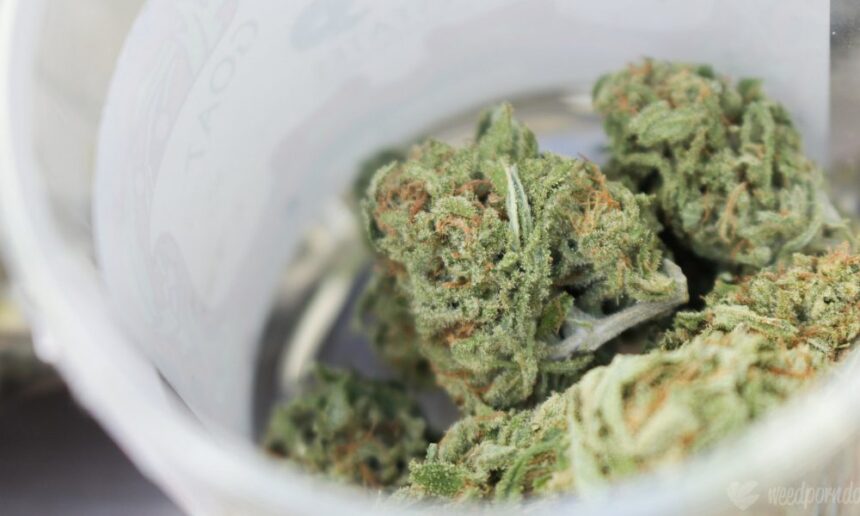A new poll signals that a Florida marijuana legalization initiative that will appear on the November ballot has enough support to pass, with majority support across every demographic surveyed.
The University of North Florida (UNF) poll, released on Tuesday, found that 64 percent of likely voters back the cannabis reform measure, surpassing the 60 percent threshold required for enacting a constitutional amendment. Notably, the respondents in the survey were read the full text of the Amendment 3 summary that will appear on their ballots.
Democrats were most supportive of the proposal at 79 percent, followed by independents (63 percent) and Republicans (50 percent). There was also majority support across each race and age demographic, as well as among both those who voted for President Joe Biden (78 percent) and former President Donald Trump (50 percent) in 2020.
Polling on the Florida initiative has consistently found majority support, though not all of the surveys have shown it reaching the steep 60 percent minimum for passage in the state. This latest poll, coming less than 100 days from Election Day, is therefore an encouraging sign for advocates.
64% support for recreational marijuana in our new Florida Statewide poll. Check out the full results in our press release at https://t.co/MK3gji1z93! pic.twitter.com/slhmEwLwDM
— PORL (@UNFPORL) July 30, 2024
However, it’s also the case that the 64 percent figure is three percentage points lower than when UNF last asked voters about the proposal last fall. And as UNF political science professor Michael Binder pointed out, it remains to be seen how successful the opposition campaign will be in driving support down.
“It’s not too clear yet how much money will be injected into the campaign against this amendment,” Binder said in a press release. “If the opposing organizations ramp up their campaigns, we may see this number come down, depending how much cash is spent in opposition.”
The survey involved interviews with 774 Florida voters from July 24-27, with a +/-4.6 percentage point margin of error.
One opposition campaign, Vote No On 3, also recently commissioned a poll on the measure that similarly found 64 percent of voters in favor of the reform.
Meanwhile, earlier this month, the Gov. Ron DeSantis (R) again lashed out against Amendment 3 at the Republican National Convention, making hyperbolic claims about what the reform would allow—claims backers say are “absolutely untrue.”
DeSantis called the proposed constitutional amendment “limitless,” arguing that it would establish a right to marijuana that would be more fundamental than First Amendment or Second Amendment protections for free speech and guns, respectively.
Speaking at a recent police event, DeSantis falsely claimed that most Colorado voters “regret” approving marijuana legalization. In fact, recent polling shows that the reform continues to enjoy strong support there.
The Florida Republican Party, meanwhile, formally came out against Amendment 3 in May.
Earlier this month, news broke that DeSantis’s so-called “Florida Freedom Fund” received a $100,000 donation from the cannabis company group POB Ventures in order to help defeat the marijuana and abortion proposals. That amount was nearly ten times what the campaign had raised in total at the beginning of July.
In an exclusive interview with Marijuana Moment, the CEO of POB Ventures, Patrick O’Brien, said he’s not against adult-use cannabis legalization in principle—but is instead troubled by the specific language of the ballot initiative because it provides an option, rather than a mandate, for regulators to approve additional licenses.
Suspicions about the motivations behind the contribution to DeSantis’s PAC aren’t likely to dissolve, especially amid new reporting from CBS News Miami that unnamed hemp businesses have joined forces to back DeSantis in his fight against the legalization measure, with a pledge to contribute $5 million collectively to the state Republican Party after the governor vetoed the bill that ostensibly would have wiped out the market by banning most consumable cannabinoid products.
It’s been previously reported that the governor is hoping to garner support for his efforts to defeat the marijuana legalization initiative from the state’s hemp industry. DeSantis seemed to concede last month that his veto of a bill to ban most consumable hemp-derived cannabinoids was at least partly because he hoped the market would aid in his anti-legalization campaign.
The DeSantis campaign committee, even with the recent contributions, is still miles behind the legalization campaign, Smart & Safe Florida, in terms of fundraising. The legalization effort has raised over $60 million since launching in late 2022.
DeSantis has been railing against the marijuana measure for months—most recently arguing that it would protect the right to use cannabis more strongly than the First Amendment protects free speech or the Second Amendment protects gun rights—and again claiming that the reform has been a “failed experiment” in states such as Colorado.
The governor said last month that the proposal would allow people to “do marijuana wherever you want—just smoke it, take it, and it would turn Florida into San Francisco or Chicago or some of these places.”
He also reprised one of his chief complaints about the potential impact of legalization: smelling cannabis.
“We’ve got to keep our streets clean. We cannot have every town smelling like marijuana. We cannot have every hotel smelling—theme parks,” he said, adding that voters don’t really understand the specifics of the legalization proposal and that ballot initiatives are generally “so bogus.”
DeSantis acknowledged that the state Supreme Court has a role in reviewing ballot language for constitutionality, and that a majority of justices determined that the marijuana measure met the legal standard. But while he previously correctly predicted the court would approve the initiative following a challenge from state Attorney General Ashley Moody (R), he now says the two dissenting justices were “correct” in trying to block voters from deciding on the measure.
DeSantis also claimed last month that that if voters approve the marijuana legalization initiative, people “will be able to bring 20 joints to an elementary school”—and he again complained about the prevalent odor of cannabis that he says would result from the reform.
Legalization has “not worked in any single place,” the governor said, and he challenged a recent ad from the campaign that promoted regulating cannabis as an alternative to the status quo of people using untested cannabis from illicit sellers.
Meanwhile, according to a Fox News poll released last month, two in three Florida voters support the cannabis initiative—with the issue proving more popular than the governor himself. The survey showed majority support for legalization across the political spectrum, too.
The governor has consistently argued that the state shouldn’t go beyond the existing medical cannabis program and that broader reform would negatively impact the quality of life for Floridians. The Florida Republican Party also formally came out against Amendment 3 last month.
Smart & Safe Florida separately announced in March that it was working to form a coalition of veterans to build voter support for the reform, and the campaign has since formally launched that initiative.
Here’s what the Smart & Safe Florida marijuana legalization initiative would accomplish:
- Adults 21 and older could purchase and possess up to three ounces of cannabis for personal use. The cap for marijuana concentrates would be five grams.
- Medical cannabis dispensaries could “acquire, cultivate, process, manufacture, sell, and distribute marijuana products and marijuana accessories to adults for personal use.”
- The legislature would be authorized—but not required—to approve additional entities that are not currently licensed cannabis dispensaries.
- The initiative specifies that nothing in the proposal prevents the legislature from “enacting laws that are consistent with this amendment.”
- The amendment further clarifies that nothing about the proposal “changes federal law,” which seems to be an effort to avoid past legal challenges about misleading ballot language.
- There are no provisions for home cultivation, expungement of prior records or social equity.
- The measure would take effect six months following approval by voters.
Here’s the full text of the ballot title and summary:
“Allows adults 21 years or older to possess, purchase, or use marijuana products and marijuana accessories for non-medical personal consumption by smoking, ingestion, or otherwise; allows Medical Marijuana Treatment Centers, and other state licensed entities, to acquire, cultivate, process, manufacture, sell, and distribute such products and accessories. Applies to Florida law; does not change, or immunize violations of, federal law. Establishes possession limits for personal use. Allows consistent legislation. Defines terms. Provides effective date.”
Economic analysts from the Florida legislature and DeSantis’s office, estimate that the marijuana legalization initiative would generate between $195.6 million and $431.3 million in new sales tax revenue annually if voters enact it. Those figures could increase considerably if lawmakers opted to impose an additional excise tax on cannabis transactions that’s similar to the ones in place in other legalized states.
Unlike the governor, U.S. Rep. Brian Mast (R-FL) said in April that he does believe Florida voters will approve the legalization initiative.
Nebraska Bill Would Levy 30% Tax On Sales Of Hemp And CBD Products To Help Offset Property Taxes
Photo courtesy of WeedPornDaily.











